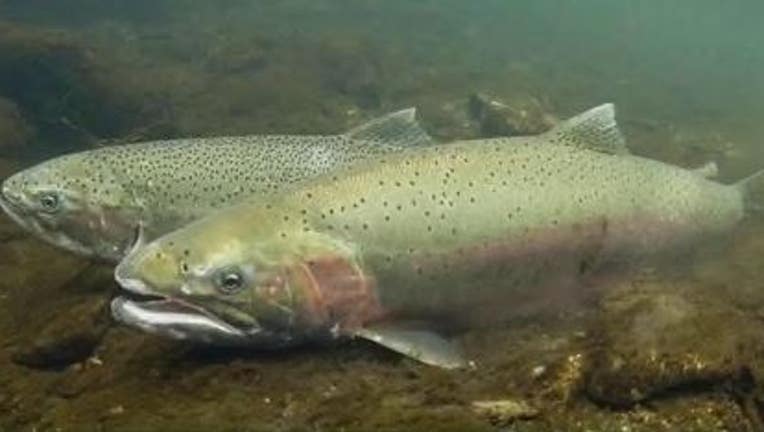WA Supreme Court approves permit for Cooke Aquaculture steelhead farming

WASHINGTON - The Washington state Supreme Court unanimously upheld permits Thursday that will allow Cooke Aquaculture Pacific to farm steelhead trout in net pens in Washington waters.
The decision clears the permit hurdle for the international aquaculture giant to change its operations from farming Atlantic salmon to steelhead in Washington.
That’s good news for Cooke and the Jamestown S’Kllalam tribe, which in 2019 announced a joint venture with Cooke Aquaculture Pacific to rear native steelhead trout.
"Aquaculture allows us to utilize best practices in protecting the environment while continuing our traditional industries growing and gathering marine-based resources," W. Ron Allen, chairman of the tribe, said in a prepared statement.
Joel Richardson, vice president of public relations for Cooke, said the Supreme Court opinion "lays to rest the array of disinformation about marine aquaculture being irresponsibly circulated by activist groups."
The Washington state Legislature in 2018 phased out Atlantic salmon farming after a spill of about 263,000 nearly mature Atlantics from Cooke’s pens at Cyprus Island in 2017.
RELATED: State approves controversial plan for Cooke Aquaculture steelhead farm
In response, Cooke is pivoting to farm steelhead, a native species, with fish altered in the hatchery to be sterile.
The Wild Fish Conservancy and other opponents to the permit had sued to block the change of fish species from Atlantic salmon to steelhead trout.
Opponents argued in King County Superior Court that the Washington Department of Fish and Wildlife had not adequately reviewed the permit under state administrative procedures or required adequate environmental review. The opponents, who lost the case, wanted the court to overturn the permits and require an environmental-impact statement.
The state and Cooke argued the review fulfilled all legal requirements — and now two courts have agreed.
The Swinomish Indian Tribal Community had joined the opponents as a friend of the court, arguing the net pen at Hope Island interferes with exercise of tribal fishing rights, and is an insult to the integrity of a place with immense cultural importance.
The tribe also argued the fish pose a risk to native steelhead.
RELATED: Washington state to phase out Atlantic salmon farming by 2022
Kelly Susewind, director of WDFW, said in an prepared statement he was pleased with the decision.
"The Court conducted an extensive review of the arguments against WDFW’s permit decision and environmental analysis, and it unanimously held that WDFW’s review was ‘more than sufficient.’ This stands as a strong endorsement of WDFW’s handling of the permit," Susewind said.
While the net pens "are not a zero-risk" operation, "we required Cooke Aquaculture to adhere to 29 mitigating provisions to guide operation of its facilities, to prevent and report potential disease, and to reduce the risk of fish escaping and improve reporting in the event of escape."
Kurt Beardslee, director of Wild Fish Conservancy, called the decision "devastating."
The real fight will gear up this year when the state Department of Natural Resources begins determining whether to renew state leases for the tidelands over which the pens are placed. That will be a more wide ranging review, Beardslee said, that considers everything from tribal treaty rights to endangered species concerns.
The DNR has already told Cooke that it may want to think twice before stocking its pens.
Get breaking news alerts in the FREE FOX 13 Seattle app. Download for Apple iOS or Android.
Stay connected with FOX 13 News on all platforms:
DOWNLOAD: FOX 13 News and Weather Apps
WATCH: FOX 13 News Live
SUBSCRIBE: FOX 13 on YouTube
DAILY BRIEF: Sign Up For Our Newsletter
FOLLOW: Facebook | Twitter | Instagram

